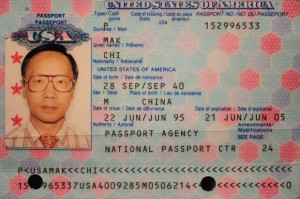Various recent articles related to espionage:
Canadian Police Arrest Man on Trying to Spy for China (Wall Street Journal)
Canadian police said they have arrested and charged a man with attempting to pass on classified military information to the Chinese government, in what could be the first case around alleged Chinese espionage prosecuted in Canada.
The Royal Canadian Mounted Police said they had charged Qing Quentin Huang, a 53-year-old Canadian citizen, under the Security of Information Act.
Police said they had detected and disrupted his alleged activities at an early stage, having been informed on Thursday that he was attempting to pass on sensitive information.
They said the individual didn’t act with state backing, suggesting that he wasn’t employed by Chinese intelligence agencies.
Mr. Huang is alleged to have tried to pass on classified material to the Chinese government concerning Canada’s national shipbuilding program, which includes military and research vessels. . . .
Hamilton man in alleged spy plot ‘strange,’ neighbour says (CBC)
. . . Robert Dixon characterized Huang as a “pretty strange guy” who made lavish purchases and whose house was occasionally visited by police.
“There was something strange about him, right from day one,” said Dixon, who estimated Huang had lived in Waterdown for about five years.
Huang acted as though “money was no issue whatsoever,” Dixon said.
“He just bought cars. ‘Oh, look my new car.’ The stuff in the house, everything was brand new and pretty elaborate. It’s clean and it has a lot of new items just kind of randomly put there.”
Dixon, who had on occasion helped Huang move items around the house, said he found it odd that his neighbour kept “a huge grandfather clock in the doorway with the price tag on it.”
It wasn’t just Huang’s possessions that struck Dixon as unusual. Police knocked on the engineer’s door on a number of occasions in response to arguments emanating from the house, Dixon said.
He said a woman who often accompanied Huang would sometimes kick the front door repeatedly, demanding to be allowed inside.
“Actually, you can see the footprints of where she would just keep kicking, wanting him to let her in,” said Dixon. “And then she would just sort of wander around the neighbourhood.
“It all seemed really strange.” . . . .
Alleged Hamilton spy plot was ‘amateur,’ espionage expert says (CBC)
The espionage plot that has a Hamilton man accused of trying to sell Canadian naval secrets to China seems more the act of an amateur than a seasoned spy operation, a Canadian intelligence expert says.
Qing Quentin Huang, 53, is accused of trying to sell sensitive information on the Canadian government’s shipbuilding procurement strategy. The national plan includes building patrol ships, frigates, naval auxiliary vessels, science research vessels and icebreakers. . . .
Espionage fears at CSIRO (Sydney Morning Herald)
Australian intelligence and security agencies are investigating a suspected industrial espionage case at the CSIRO (Commonwealth Scientific and Industrial Research Organisation), the nation’s top scientific organisation.
In revelations that will further test Australia’s relations with China, federal police and intelligence officials are investigating a Chinese national who until last week worked in the CSIRO’s highly sensitive nanotechnology laboratory in Melbourne.
The man, a post-doctoral student, is being investigated for allegedly accessing sensitive CSIRO data. A focus of the intelligence probe is determining whether the man sent CSIRO information to a foreign power.
The CSIRO’s nanotechnology area works closely with Australia’s Defence Science and Technology Organisation. . . . (read more)
Chinese’s scientist absence exposed alleged spying activities at CSIRO (Sydney Morning Herald)
A CSIRO scientist’s failure to show up for work led Australia’s top scientific organisation to uncover a suspected spy in its ranks.
The Chinese scientist at the centre of an industrial espionage probe had missed three days of work last week, prompting CSIRO management to ask police to visit his suburban Melbourne residence to check on his welfare.
But by the time the officers arrived, the scientist was nowhere to be seen.
Fairfax Media understands he had left the country days earlier, possibly returning to China.
It is believed CSIRO databases had been accessed from the computer equipment and confidential information may have been used in an unauthorised fashion. . . .
Huawei decides to exit the US market over cyber espionage concerns (TechSpot)
Chinese networking and telecommunications equipment provider Huawei is calling it quits in the US. CEO Ren Zhengfei recently told French news site Les Echos that it wasn’t worth it for his company to get in the middle of US/China relations and as such, they have decided to exit the US market.
Zhengfei is of course referring to the ongoing dispute between the two nations on the technology front.
Specifically, many US officials believe the company is an unambiguous security threat to the US. These people suspect Huawei may be working with the Chinese military to conduct cyber espionage against the US and other countries. . . .
Spy Tells of Her “Working Relationships” (Daily NK)
. . . . Now 40 years old, Won Jeong Hwa was arrested for espionage in 2008 and released in July this year after serving five years in prison.
Originating from North Hamkyung Province, she worked in China earning foreign currency and participating in intelligence operations until dispatched to South Korea in 2001.
Speaking about her espionage actions, Won revealed that she deliberately initiated a relationship with a South Korean man in China in order to become pregnant, believing that her passage to the South would be easier as a result.
Thereafter, while in South Korea, she came under suspicion after forming relationships with a number of military officers, and was eventually arrested in 2008 following a three-year investigation. . . . .
Gardner R. Hathaway, CIA chief of counterintelligence, dies at 88 (Washington Post)
Gardner R. Hathaway, a former CIA chief of counterintelligence whose nearly four-decade career with the agency took him to Cold War focal points ranging from Berlin to Moscow and placed him at the center of many espionage episodes, died Nov. 20 at the Vitas hospice in Vienna., VA. . . .
. . . . In 1985, after a stint as chief of the CIA station in Bonn, Germany, Mr. Hathaway was appointed chief of counterintelligence.
He became alarmed after a number of Soviet agents working for the Americans were taken into custody or disappeared during the last eight months of 1985. He suspected a mole had penetrated the agency.
In 1986, Mr. Hathaway assembled a team of trusted colleagues to investigate and look for common threads. The hunt would culminate in 1994 with the arrest of Aldrich Ames, a CIA counterintelligence officer who had been selling secrets to the Soviets. . . .
German man gets 7-year sentence for stealing secrets from NATO at Ramstein Air Base (Stars and Stripes)
A German court sentenced a former employee of NATO’s air command headquarters at Ramstein Air Base to seven years in prison Tuesday on espionage charges after determining the IT expert stole confidential data and intended to sell the potentially damaging information to a foreign adversary.
Manfred K., whose full name has not been released, maintained he never intended to do harm with the data and only copied the information to expose security flaws at NATO, a claim the court rejected, according to a court news release.
NATO’s air command headquarters at Ramstein is the hub for all NATO air missions and a growing missile defense program.
The 61-year-old German citizen left NATO after retiring in July 2012. Previously, he had a dispute with the organization over compensation for early retirement, said Thomas Henrichs, a spokesman for the Koblenz court in western Germany. He had worked for the military alliance since 1979. . . .
. . . . The man copied passwords for NATO computer systems, server locations and other information that would have enabled a potential adversary to disrupt or infiltrate NATO’s cybernetwork, the court found.
The information was the “crown jewels” and “operative heart” of the system and would have allowed a foreign power to launch a cyberattack with “devastating impact”, said presiding judge Andreas Völpel, as cited by the German news agency dpa.
Manfred K. sent the data to his private email account and then saved it on USB memory sticks, which he hid in his house in the district of Donnersbergkreis, according to information from the court.
He first copied data from NATO’s secret network in March 2012. A second attempt in June failed, after he was refused clearance for the data transfer and NATO’s security office was notified, according to the court. Manfred K. was arrested and detained in August 2012, after his house was searched. . . . .











